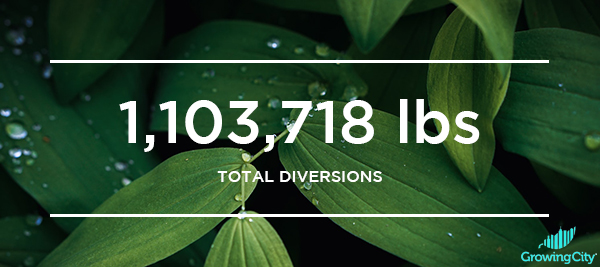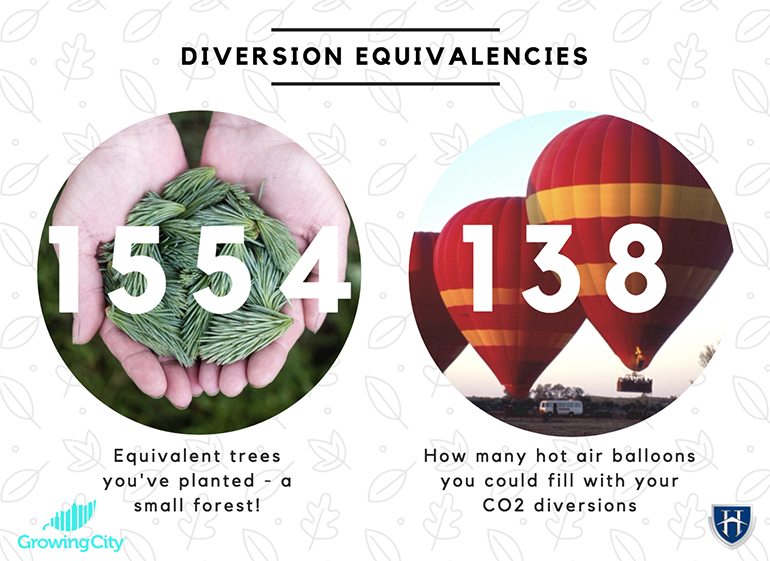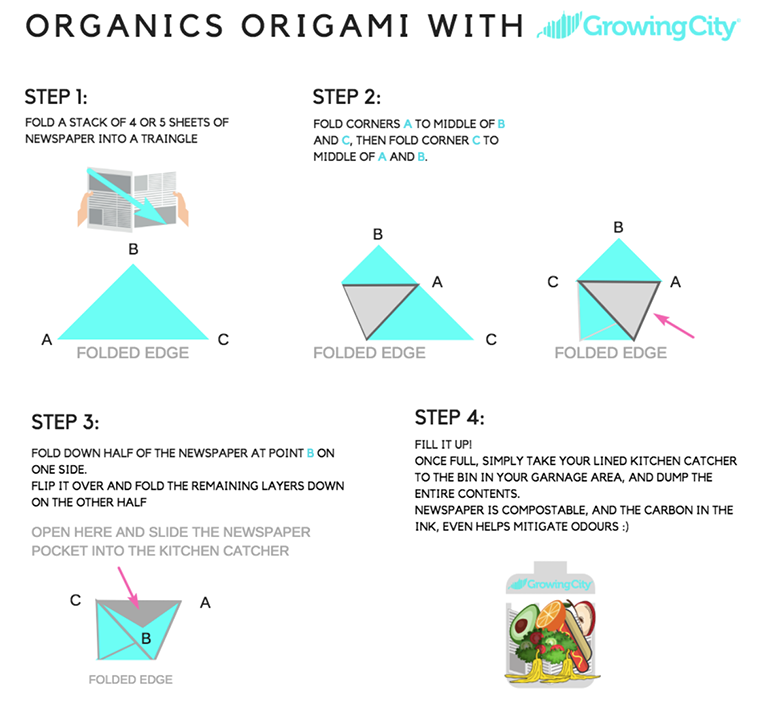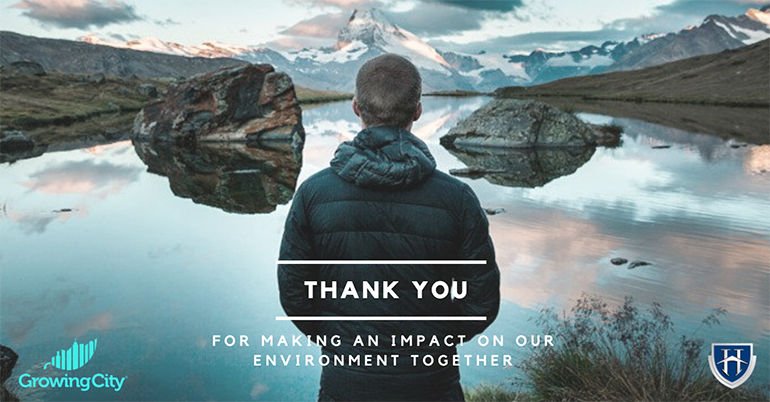Growing City provides organics recycling for Hollyburn Properties in the Lower Mainland region of BC. Since 2015, Growing City and Hollyburn have diverted more than 1,103,718 lbs from the landfill together. That’s quite the accomplishment!

Why compost food scraps?
It’s great for our environment! When food waste and other organic material is sent to the landfill, it is buried without access to light or oxygen. Landfills are anaerobic, operating without oxygen and releasing methane. Contrarily, compost piles use oxygen and cut down on the amount of carbon dioxide produced. By composting, we prevent more greenhouse gases from releasing into our atmosphere and contributing further to climate change.
It’s beneficial for humans! When all that organic matter decomposes into rich compost, gardeners and farmers can use it as a supplement to their soil. Compost adds vitamins and nutrients to the soil where nutritious plants then can grow. These plants are the fruits and veggies that we all eat, resulting in healthier, happier humans. 🙂
It’s improving our city! In 2015 Metro Vancouver introduced the Organics Disposal Ban to begin diverting food scraps away from the landfill. The City of Vancouver has been especially diligent about enforcing this ban as part of the Greenest City Action Plan. We’re currently on track in terms of reaching our 2020 target, but did you know we still have about 100,000 tonnes left to divert to reach our goal? By partaking in the Growing City program, Hollyburn and its tenants are helping the city reach those targets.

What can you do for your composting program?
It’s simple – all you need to do is separate organic materials from your waste. Each unit will have a small kitchen bin that you can use to collect any accepted organic material listed. The bin can either be lined with compostable liners or newspaper to keep it clean. Not to mention, the high carbon content in newspapers also helps absorb odors and liquids.
What is accepted in your bin?
Almost 40% of your regular waste can be added into your compost bin! Separating organic material from your waste is easy as long as you know what can and cannot be composted.
You might’ve noticed we said you can line your bins with “compostable” and not “biodegradable” liners. Did you know that “compostable” and “biodegradable” have different definitions?
Compostable items have a known time-frame to fully break down during one composting cycle. This means 3 to 6 months and varies between commercial and home composters. The material is typically plant-based and made of 100% natural materials (such as corn).
Biodegradable means that the product will break down eventually, but there is no set certification or time-frame to be met. This means that it can go through multiple composting cycles, and still not be fully broken down – even after many years!
Accepted
- Food scraps
- Paper plates & bags
- Pizza boxes
- Tea bags
- Paper coffee cups (w/out lid)
- Wooden stir sticks & chopsticks
- Cheese
- Pasta noodles
- Plants and flowers (avoid weeds that have gone to seed)
- Compostable liners & products (must be certified “COMPOSTABLE”, not biodegradable)
Not Accepted
- Glass, metal or plastic
- Rubber bands
- Plastic stir sticks & straws
- Coffee pods (unless reviewed & approved by GC)
- Biohazardous materials (diapers, pet litter, etc.)
- Liquids (soups, coffee, sauces, etc.)
- Soil and gravel

What can you do about that compost fragrance?
As summer approaches and the temperature rises, decomposition occurs at a faster rate. This means that some scents might begin to be noticed quicker in your units… but, there’s nothing to fear! There are several tips to keeping your spaces fresh and clean, while continuing to grow your compost program.
Summer Green Bin Tips
- Paper based materials soak up any excess liquids, and mitigate odours. It’s also an important element when making good compost. Adding coffee filters, tea bags, paper towels and even newspapers can help cut odours and mess from your organics bin.
- Remember that heat speeds up decomposition. Try keeping your food scraps in your fridge or freezer until pickup day.
- Fruit flies and maggots have a life cycle of 48 hours from being laid to hatching. Larvae is often laid in fruit skins and peels, so keeping fruit refrigerated until you’re ready to eat it will help keep them from hatching in your kitchen. Taking your food scraps out a minimum of every 2-3 days will mitigate any potential for critters in your kitchen bin.
- Sprinkle some baking soda in the bin – this will prevent acidity from building up and breaking down material too quickly.
- High sugar content can attract critters and provide an ideal environment for eggs and larvae. Be mindful to wrap up items such as high sugar fruit and sweets in newspaper or compostable bags, before putting them into your bin.
- Certain foods spoil quicker than others, which can lead to odors. Watch out for broccoli, kale, tomatoes, potatoes, and anything high in Vitamin C.
- Proteins can mean odor. Save your meat, fish and bones in your fridge or freezer until pickup day, and try to contain them in paper or compostable bags or newspaper where possible.

Guest blog post by Growing City.
To learn more visit GrowingCity.com/faq-support-center/
